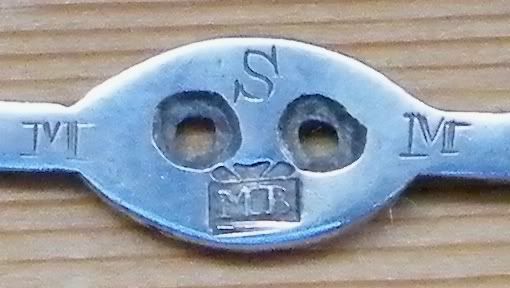I am very impressed that you can find EM in the mark !
But could it be BM ?
The design of the top very much reminds me of the mark on a pair of buckles that have puzzled me for some time. The buckles date to around 1775 but with a mark more characteristic of the period of this spoon. No assay marks on them but I am 99 % sure these are English. Since they are of a slightly unusual pattern also seen with Benjamin Mordecai/Montigue's BM mark, I suspect they may be another of Benjamin's reversed marks. One is recorded by Grimwade as the only reversed mark known to him.
Our Benjamin is known to have had marks earlier than the one of 1770 given in Grimwade, since he appears in the broken plate book at Goldsmiths Hall in the 1763 -1769 period - with a parcel of substandard buckles ! Substandard silver seems to have been one of his specialities as he leads the PR 1773 list of broken plate 1766 -1772 at a massive 98 lbs. Bucklemakers were traditionally regarded as rogues - often with good reason.
I doubt if the Benjamin Montigue who probably ceased trading in the late 1790's marked this spoon - unless he lived a very long time - but perhaps his father ???
Pure speculation of course !

.

